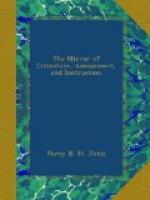All the rooms (except the gallery) were hung with loose arras, a great part of which still remains; and the doors were concealed every where behind the hangings, so that the tapestry was to be lifted up to pass in or out. The doors being thus concealed, are of ill-fashioned workmanship; and wooden bolts, rude bars, &c. are their only fastenings. Indeed, most of the rooms are dark and uncomfortable; yet this place was for ages the seat of magnificence and hospitality. It was at length quitted by its owners, the Dukes of Rutland, for the more splendid castle of Belvoir, in Lincolnshire.
For many generations Haddon was the seat of the Vernons, of whom Sir George, the last heir male, who lived in the time of queen Elizabeth, gained the title of king of the Peak, by his generosity and noble manner of living. His second daughter and heir married John Manners, second son of the first Earl of Rutland, which title descended to their posterity in 1641. For upwards of one hundred years after the marriage, this was the principal residence of the family; and so lately as the time of the first Duke of Rutland, (so created by queen Anne,) seven score servants were maintained, and during twelve days after Christmas, the house was “kept open.”
A few years before the death of Mrs. Radcliffe, the writer of “The Mysteries of Udolpho,” and several other romances, a tourist, in noticing Haddon Hall, (and probably supposing that Mrs. R. had killed heroes enough in her time,) asserted that it was there that Mrs. R. acquired her taste for castle and romance, and proceeded to lament that she had, for many years, fallen into a state of insanity, and was under confinement in Derbyshire. Nor was the above traveller unsupported in her statement, and some sympathizing poet apostrophized Mrs. R. in an “Ode to Terror.” But the fair romance-writer smiled at their pity, and had good sense enough to refrain from writing in the newspapers that she was not insane. The whole was a fiction, (no new trick for a fireside tourist,) for Mrs. Radcliffe had never seen Haddon Hall.
In the “Bijou” for 1828, an elegant annual, on the plan of the German pocket-books, (to which we are indebted for the present engraving,) are a few stanzas to Haddon Hall, which merit a place in a future number of the MIRROR.
* * * * *
POETICAL LOVE-LETTER.
(For the Mirror.)
The sweeper of New Haven College, in New England, lately becoming a widower, conceived a violent passion for the relict of his deceased Cambridge brother, which he expressed in the following strain:—
Mistress A—y.
To you I fly,
You only can relieve me;
To you I turn,
For you I burn,
If you will but believe me.
Then, gentle dame,
Admit my flame,
And grant me my petition:
If you deny,
Alas! I die
In pitiful condition.




